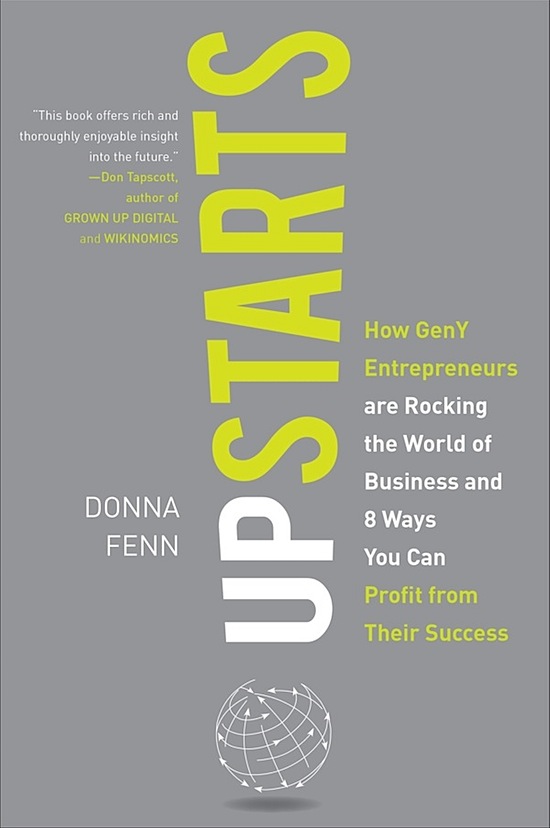By Donna Fenn
Author of Upstarts! How GenY Entrepreneurs Are Rocking the World of Business and 8 Ways You Can Profit from Their Success
Last spring, the Bureau of Labor Statistics reported that unemployment among 18 to 25-year-olds was a staggering 16.1%. That was grim news for college grads, plenty of whom headed straight to grad school, or promptly moved their belongings into the family basement. If you are among this army of unemployed or underemployed young people, it’s time you considered another option: start your own business.
In the middle of a recession? Absolutely. Lots of great companies were founded in lousy economies: Trader Joe’s, Clif Bar, MTV and Wikipedia are among them. Typically there’s an uptick in startup activity during recessions. Why? Resources are cheaper, there’s an available talent pool, and big companies that are focused on keeping their heads above water often let quality and service go by the wayside. That all spells opportunity for smaller, innovative, and agile players. Besides, what have you got to lose? Probably not much right now. You’re young and you probably don’t have a mortgage and a family to support. And rumor has it that you don’t mind sleeping on futons or eating lots of Ramen. So if you’ve got an idea percolating, here’s how to get started:
1. Choose partners wisely.
Of the entrepreneurs I surveyed for my book, Upstarts: How GenY Entrepreneurs Are Rocking the World of Business (McGraw-Hill, 2009), 64% had started companies with partners. There’s a good reason for that. A partner will minimize your financial risk and instantly expand your knowledge base, provided you choose someone with skills complimentary to your own. Do not sign on with “mini-me!” Your partner should hold your feet to the fire, but also be supportive when things get tough. Sound like marriage? It is, but riskier. So lay out the terms of your partnership in writing with an attorney. Be sure to address what happens if one of you wants out. One more thing: note that these points about partners come before we even discuss your idea. Every venture capitalist worth his or her salt will tell you that the team is more important the idea. Even if you never plan to seek outside investors, remember this mantra: it’s the team, stupid!
2. Don’t be a perfectionist.
Launch your product or service fast and imperfectly, because the more time you spend planning and tweaking, the more time you give a competitor the chance to sneak up behind you and eat your lunch. And if you launch quickly, customers will typically help you adapt your product according to their own needs. When Sam Altman launched Loopt, a personal GPS-like mobile application, his first version was a flop with young women who demanded better privacy settings. The result: Altman took that customer feedback and used it to create a better version of Loopt — one that customers felt invested in because they helped create it.
3. Tap outside resources.
They’re more plentiful than you think. You might start with your alma mater. Miles Lasater and Mark Volchek, the Yale University-based founders of Higher One, a financial services company that focuses on the higher education market, did just that. They sent out a selective mailing to prominent Yale alumni simply seeking out sound advice and ended up getting a chunk of financing as well. Also, don’t be afraid to ask people in your own industry for help; if they’re in non-competitive markets, they may be surprisingly helpful. Brian Adams, the founder of Restoration Cleaners in Houston, assembled a peer group of 12 dry cleaners in different parts of the country to help him learn about the industry, thus shortening his leaning curve.
4. Be a proud bootstrapper.
It’s wildly difficult to raise capital right now. No worries. Sure, you need some cash, but probably not as much as you think. If you have a good credit rating (and you had better!), apply for a line of credit before you actually need it; draw your vendors into your company vision and negotiate favorable terms with them; ask all partners to tap into their own savings so that everyone has skin in the game. Remember that having limited resources often forces you to make better decisions and to be financially disciplined from the get go. This will serve you well as you grow. My Upstarts! survey revealed that while approximately half of the companies that had received angel or venture funding were in the black, nearly 80% of the self-funded companies were profitable!
Donna Fenn, author of Upstarts! How GenY Entrepreneurs Are Rocking the World of Business and 8 Ways You Can Profit from Their Success and Alpha Dogs: How Your Small Business Can Become a Leader of the Pack, is a contributing writer at Inc. magazine. An expert on small business trends and entrepreneurship for more than 20 years, she is also a community leader on Work.com, a featured expert on SBTV.com, and a blogger on Inc.com. She lives in Pelham, NY, with her husband, Guian Heintzen, and is the proud mom of two GenYers.
Related Post: When Unemployed, Do This


